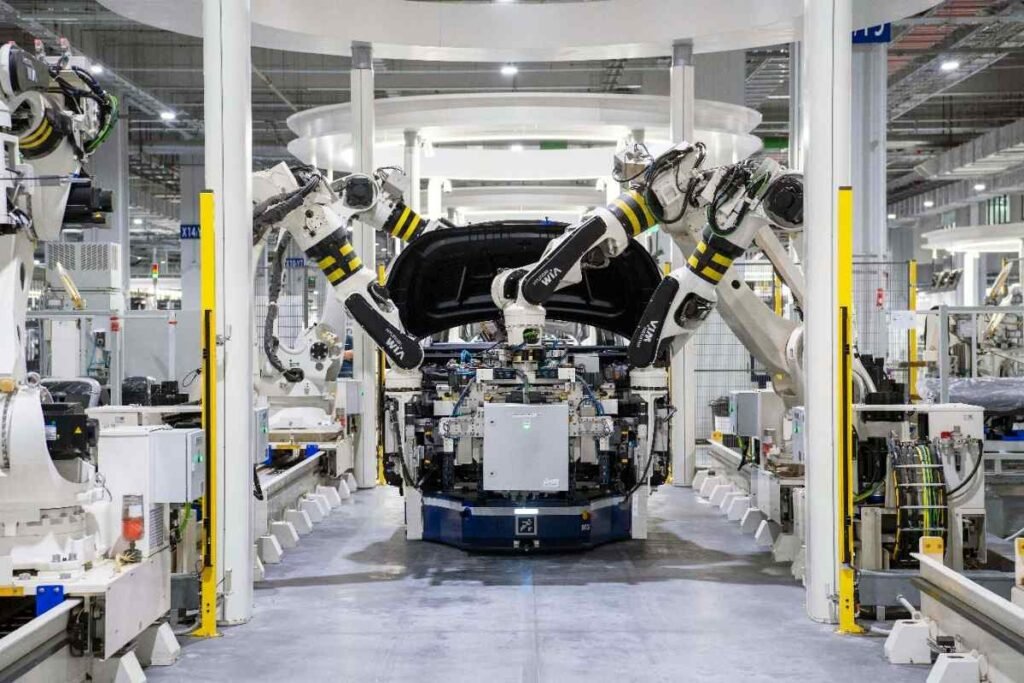Over the years, several industries have been transformed by contract manufacturing. According to Grand View Research, a study shows that the global contract manufacturing market size was estimated at USD 1.03 trillion in 2020 and is expected to grow at a CAGR of 7.1% from 2021 to 2028. This remarkable growth indicates an increasing dependence on contract manufacturing services. However, what exactly is contract manufacturing? Why are many companies going for it?
What’s Contract Manufacturing?
Definition And Basics
Contract manufacturing means one company paying another firm to produce its products or components for it. Businesses can thus use the facilities and expertise of the contract manufacturers without having their infrastructure, which would be very expensive on investment. The essay will delve into why this has become the future for many firms and emphasize economic benefits, focusing on core competencies in addition to risk management and access to advanced technology.
This type of outsourcing involves third-party manufacturers handling production processes. It could mean producing whole products or certain parts only. Different types of contract manufacturing include Original Equipment Manufacturers (OEMs) who are product integrators; Contract Manufacturing Organizations (CMOs) that provide support services like logistics; and Original Design Manufacturers (ODMs), who not only manufacture but also develop new products.

History And Evolution
Through time there have been great changes in the concept of contract manufacturing where it began as a method employed mainly by large corporations for cost reduction purposes but over time with globalization and technological advancements, even small firms made use of it. Milestones include rapid expansion of the electronics industry during the eighties followed by growth in pharmaceuticals contracted manufacturing during the nineties.
Economic Advantages
Cost Savings
Most companies choose contract manufacturing for cost savings. This means that through production outsourcing, a company can save huge amounts in capital expenditure as it does not need to own or lease manufacturing facilities and infrastructure. In addition to this, labor costs are often lower when using contract manufacturers, especially when outsourcing production to locations with low-cost labor.
Scalability
In terms of scalability, contract manufacturing is unrivaled. Companies can easily scale production up or down based on demand without the constraints of fixed production capacity. This way, such business enterprises can react promptly in the market when changes occur as well as during seasons thereby avoiding overstretching themselves.
Efficiency And Speed
Outsourcing of this kind typically results in quicker time-to-market because specialized manufacturers tend to have streamlined processes and experience which enable them to produce high-quality items more efficiently. Additionally, this enhances productivity by minimizing management overhead spent on running factories hence freeing up time required for innovation in other areas of the firms.
Concentrating On Core Competencies
Allocation Of Resources
Through contracting out production activities, firms can redirect their resources towards core functions such as marketing, sales, and research and development. In this case therefore companies focus only on what they are best at enabling them to become creative and grow faster.
Innovation And Development
When you have more resources available for R&D your capacity for innovation increases. They may choose to invest in developing new products while improving existing ones while their counterparts continue managing productions.
Competitive Advantage
Focusing on a company’s best activities, such as product design, marketing, or customer service enables it to remain ahead of the competition. Contract manufacturing allows businesses to stick to their area of expertise while relying on expert manufacturers for production.

Access to Advanced Technologies
Technological Expertise
Often contract manufacturing companies possess the most up-to-date manufacturing technologies and know-how. Partnering with these firms enables companies to have the benefits of cutting-edge technology without having to make large investments in new equipment or training.
Quality and Compliance
Manufacturing requires high standards of quality control and compliance with industry regulations. With contract manufacturers who maintain these standards, the products will meet all compliance requirements. Thus reducing recall risks and enhancing customer satisfaction.
Risk Management
Mitigation of Risks
Outsourcing production enables companies to mitigate numerous risks. This is done by sharing or transferring the production risks onto the contract manufacturer hence decreasing the risk of hiring the company at large . Moreover, there are no longer investment risks as capital must not be invested heavily in facilities used for manufacturing.
Supply Chain Flexibility
Contract manufacturing also provides more supply chain flexibility. Companies can modify their supplier’s mix so that they can rely less on one supplier or region which results in a more robust supply base that may better absorb disturbances.
Case Studies and Examples
Successful Implementations
Many companies have successfully adopted contract manufacturing. For instance, Apple outsources iPhone production through Foxconn which is one of the leading contract manufacturers globally. Through this partnership, Apple can focus on design and innovation while leveraging Foxconn’s expertise in manufacturing.
Industry-Specific Insights
Different sectors adopt different strategies when it comes to contracting manufacturing services. The electronics industry depends on OEMs mainly for making complex components while pharmaceutical industry CMOs are responsible for drug making allowing pharmaceutical firms to carry out research as well as development. The automotive sector equally uses contract Manufacturing where ODM produces various parts and components.

Challenges and Considerations
Potential Drawbacks
Though contract manufacturing presents numerous advantages, there are some potential disadvantages. Companies may lose some control over the manufacturing process and this can affect the quality of goods as well as delivery times. Besides, third-party manufacturers will be relied upon by companies hence exposing them to risks in case such manufacturer faces problems.
Strategic Considerations
Choosing the right contract manufacturing partner is vital. Consequently, organizations should establish strong relationships with their partners and maintain consistent communication with them. This ensures that expectations are met and any issues arising are dealt with immediately.
Risk Mitigation Strategies
To guarantee quality as well as reliability, firms need to implement contractual safeguards along with performance metrics. Frequent audits and performance reviews can help monitor adherence to set standards while also addressing issues early enough.
Final Thoughts
For modern businesses, contracting out production is no longer just about cost-saving but rather a strategic approach that fosters innovation efficiency, and growth. Contract manufacturing should therefore be considered by companies as a means of improving their competitiveness in the market for sustainable success over time.


1 thought on “Why Contract Manufacturing Is the Future for Many Companies”
Comments are closed.